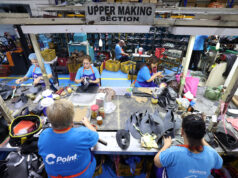Jury still out on whether TRAIN will spur household consumption
By Krista Angela M. Montealegre
National Correspondent
AS CONSUMERS take on the burden of higher sales taxes, there is lingering uncertainty over the impact of the tax reform program on consumption — a key growth engine of the economy.
While the first of up to five planned tax reforms — Republic Act No. 10963, or the Tax Reform for Acceleration and Inclusion (TRAIN) that was enacted last month and which took effect on Jan. 1 — will put more money into the pockets of Filipino wage earners who will now pay lower personal income tax, concerns have been raised over the tax plan’s potential effect on household spending since it will jack up levies on fuel, cars, tobacco, coal and sugar-sweetened drinks, among others.
Golden Arches Development Corp. (GADC), the master franchise holder of McDonald’s in the Philippines, and Max’s Group’s Inc., the country’s largest casual dining operator, will see higher input costs as a result of the tax plan overhaul, which they may pass on to consumers to protect their margins.
“There’ll be some period of resistance, but eventually we’ll be okay. I’m still very confident,” GADC President and Chief Executive Officer Kenneth S. Yang told reporters last week.
The Bangko Sentral ng Pilipinas (BSP) expects 2018’s full-year inflation to accelerate to 3.4% from 3.2% in 2017, with higher excise taxes adding “less than one percentage point” to price increases this year.
Consumption accounts for more than 60% of gross domestic product, which measures the value of final goods and services produced in a country.
“We may have to raise prices because our beverage prices will go up, but what we try to do is we balance everything out to make sure we continue to provide a lot of value for our customers,” Mr. Yang said.
McDonald’s offers bundled value meals that pair soda with regular fast-food menu staples hamburger and fried chicken.
S&R Membership Shopping has stopped serving unlimited soft drinks at the start of the year due to the higher taxes on sweetened beverages.
Max’s Group, on the other hand, is also exploring a number of options to mitigate higher input costs, including price increases and leveraging on its scale, Paul C. Cheah, the company’s investor relations officer, said in a mobile phone message.
“The market can absorb a price increase of 1-3% every year and when you go beyond that level, consumers cut down on their eating-out spend,” COL Financial Group, Inc. Head of Research April Lynn L. Tan said in a phone interview.
In the past, some companies had opted to cut the size of some their products instead of raising prices amid stiff competition in the industry.
Still, McDonald’s plans to open at least 40 branches this year and Max’s Group intends to roll out 80-90 new stores, including 20-30 outlets overseas, underscoring the solid outlook for their businesses, company officials said.
“The tax reform law is seen to boost consumer discretionary spending which in general should benefit the retail/food and beverage sector,” Mr. Cheah said.
SM Prime Holdings, Inc., the country’s biggest shopping mall developer and operator, also expressed confidence that consumer spending will stay robust despite the impact of higher inflation.
“Despite the increase taxes on key consumer products like fuel, sugar-related and ‘sin’ products, the overall impact favors higher purchasing power of most consumers,” SM Prime President Jeffrey C. Lim said in a text message, citing the higher net take-home pay of most salaried workers.
Rajiv Biswas, Asia-Pacific chief economist at IHS Markit, concurred with Mr. Lim’s statement in an e-mail, saying the outlook for consumer spending remains strong for the year despite the implementation of the initial package of the tax reform program of President Rodrigo R. Duterte.
The sustained rapid economic expansion, expected to grow 6.5% year-on-year, will help support growth in household incomes, underpinning consumer spending growth that will also be boosted by lower income taxes in the tax reform package, Mr. Biswas said.
However, there have been some cautionary signs on spending even before the higher taxes kicked in.
Market research firm Kantar Worldpanel projected last month a “downward trend” in the purchasing confidence of Filipinos, who are buying less fast-moving consumer goods (FMCG) as they become “more conscious” of their spending.
“The impact (of the tax reform law) will not be immediate. We haven’t seen yet our take-home pay so most Filipinos are on a wait-and-see mode,” Lourdes B. Deocareza, new business development head at Kantar Worldpanel, said in a telephone interview.
Ms. Deocareza cited the weak purchasing confidence data, which stood at -11.8 points in July to September 2017, down from a confidence rating of 0.8 in the same period in 2015.
“Filipinos, generally, are not risk-takers. We are more prudent when it comes to these things. Kung before pa lang na (If we had been) leaning on the cautious side na, how much more with the TRAIN program happening,” she said.



